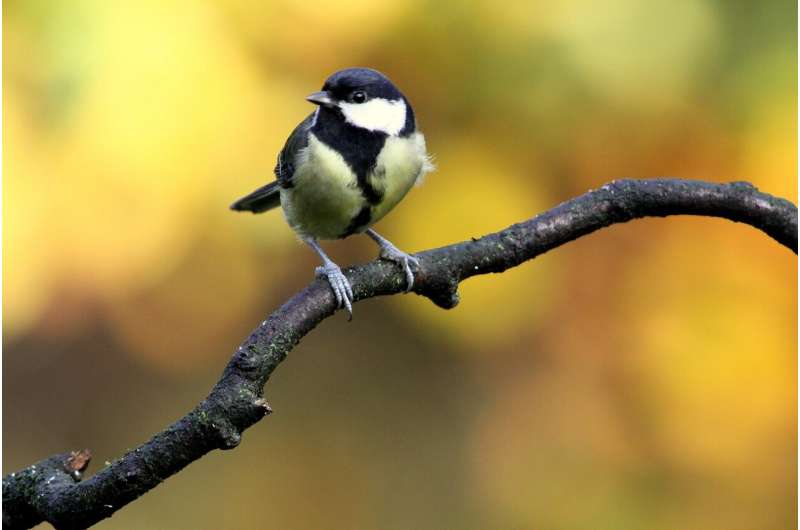Study of great tits, oak trees and caterpillars reveals complexity of climate change

A trio of researchers at the University of Oxford has found that studying the interrelationships between great tits, oak trees and caterpillars in Wytham Woods, in Oxfordshire, England, near Oxford, has revealed some of the complexities involved in studying changes wrought by global warming. In their paper published in the journal Nature Climate Change, Ella Cole, Charlotte Regan and Ben Sheldon describe their analysis of data obtained from 60 years of study focused on great tits in Britain.
Great tits are a type of songbird found in western Europe and parts of eastern Asia. They are also a type of passenger bird and have a distinctive look with black heads and necks, white cheeks, olive upper parts and yellow underparts. The popular species has been the focus of study by groups in Britain for approximately 60 years. In this new effort, the researchers sought to learn more about how the birds are faring as the planet heats up due to global warming. To that end, they obtained data from multiple studies of the birds and discovered that temperatures in the area have increased by 2.6 degrees Celsius over the past 60 years and that has led to the great tits moving their mating and egg laying to earlier in the spring each year. The data showed that on average, the birds are currently laying their eggs approximately 16.2 days earlier than they did 60 years ago. But they also found that there was much more to the story.
Great tits feed their nestlings, caterpillars, which they find living on oak tree leaves. Thus, their very existence depends on how the caterpillars and oak trees are faring as the planet warms. To learn more about the relationship between all three, the researchers looked deeper into the data from prior research efforts. They found that oak leaves in the area have been appearing earlier as spring has come earlier each year, and that caterpillars have begun appearing on the leaves earlier each year, as well. But they also found that the caterpillars and leaves were arriving slightly earlier than the tit nestlings, which suggested that they could soon be out of sync with them. Further study also showed that larvae populations were higher in areas where there was a healthier oak tree canopy, which led to more caterpillars on their leaves. Thus, if warmer temperatures lead to thinner canopies, there could be fewer caterpillars, and because of that, fewer great tits.
The researchers suggest their study shows how delicate the balance can be in certain ecosystems, and how difficult it is to predict what impact global warming will have on any given system due to the number of variables involved.
Birds time breeding to hit ‘peak caterpillar’
Ella F. Cole et al, Spatial variation in avian phenological response to climate change linked to tree health, Nature Climate Change (2021). DOI: 10.1038/s41558-021-01140-4
© 2021 Science X Network
Citation:
Study of great tits, oak trees and caterpillars reveals complexity of climate change (2021, September 28)
retrieved 28 September 2021
from https://phys.org/news/2021-09-great-tits-oak-trees-caterpillars.html
This document is subject to copyright. Apart from any fair dealing for the purpose of private study or research, no
part may be reproduced without the written permission. The content is provided for information purposes only.
For all the latest Science News Click Here
For the latest news and updates, follow us on Google News.

